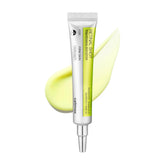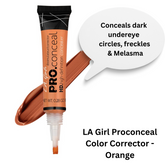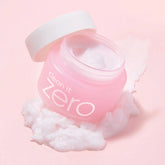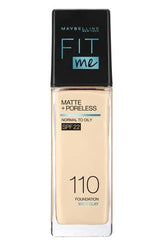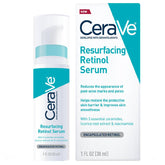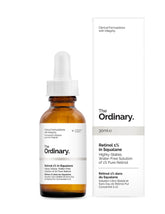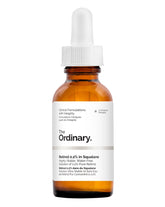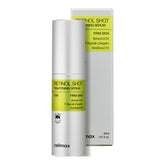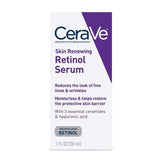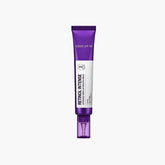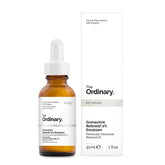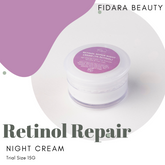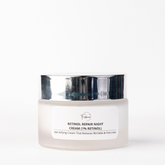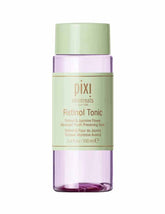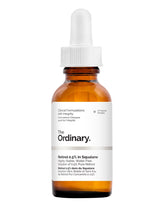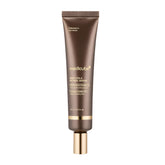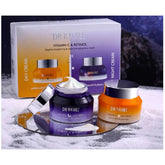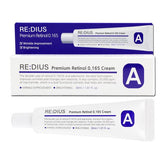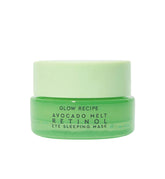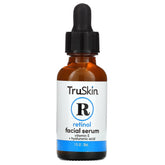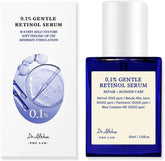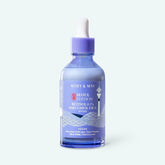-
Celimax The Vita-A Retinal Shot Tightening Booster 15ml Targeted Anti-Aging Solution with Encapsulated Retinal & Skin Barrier Support Product Overview The Celimax The Vita-A Retinal Shot Tightening Booster (15ml) is a high-performance anti-aging treatment serum formulated to visibly tighten, smooth, and rejuvenate the skin....
- Rs. 4,699
- Rs. 4,699
- Unit price
- per
-
Product Description: Experience the transformative power of Cerave Resurfacing Retinol Serum, your key to smoother, more radiant skin. Formulated with a potent blend of retinol and ceramides, this serum works tirelessly to refine texture, minimize the appearance of pores, and fade discoloration, revealing a...
- Rs. 6,800
Rs. 7,200- Rs. 6,800
- Unit price
- per
-
The Ordinary Retinol 1% in Squalane in Pakistan A potent solution for achieving radiant, youthful skin. This highly effective serum is crafted with precision, combining the power of 1% pure retinol and nourishing squalane for a transformative skincare experience. Key Features: High-Potency Retinol (1%):...
- Rs. 4,350
- Rs. 4,350
- Unit price
- per
-
Product Description: Unveil the radiant, youthful complexion you've been longing for with The Ordinary Retinol 0.2% in Squalane. Crafted with meticulous precision, this transformative skincare solution integrates the power of retinol with the nourishing properties of squalane to deliver unparalleled results. Key Features: 0.2%...
- Rs. 4,250
- Rs. 4,250
- Unit price
- per
-
Celimax Retinol Shot Tightening Serum (30ml) Celimax Retinol Shot Tightening Serum is a potent anti-aging serum designed to visibly firm, tighten, and rejuvenate the skin. Infused with a concentrated dose of retinol, this serum works to improve skin elasticity, smooth fine lines, and promote...
- Rs. 4,999
Rs. 5,600- Rs. 4,999
- Unit price
- per
-
CeraVe Skin Renewing Retinol Serum is a powerful yet gentle serum designed to improve skin texture, reduce the appearance of fine lines and wrinkles, and enhance overall radiance. Ideal for various skin types, including sensitive skin, this serum is a great addition to your...
- Rs. 6,500
Rs. 6,500- Rs. 6,500
- Unit price
- per
-
Introducing Some By Mi Retinol Intense Advance Triple Action Eye Cream (30ml) – a potent and innovative solution crafted to address multiple concerns around the delicate eye area. This advanced eye cream is designed to diminish fine lines, reduce dark circles, and provide intense...
- Rs. 5,599
Rs. 5,990- Rs. 5,599
- Unit price
- per
-
Description Granactive Retinoid 2% Emulsion is a creamy serum that targets visible signs of aging through a highly-advanced retinoid active, one of the beMS all-around ingredients for skin. This next-generation retinoid improves the appearance of fine and dynamic lines that arise from a loss...
- Rs. 4,999
Rs. 5,300- Rs. 4,999
- Unit price
- per
-
Fidara Beauty Retinol Repair Night Cream is a powerful yet simplistic and well-balanced formula. It simplifies your existing skincare regimen and fits in just right. It works through the night to deliver the power of retinol on your skin thus reducing the most deep,...
- Rs. 300
- Rs. 300
- Unit price
- per
-
Good Night, Great Skin: Retinol Repair by Your Side This lightweight and fast-absorbing formula is designed to restore youthful radiance and reduce wrinkles overnight. Loaded with Vitamins E and B, and essential fatty acids, this powerhouse cream works to protect skin, reduce signs of...
- Rs. 1,999
Rs. 2,500- Rs. 1,999
- Unit price
- per
-
Vendor: Pixi BeautyPixi Beauty Retinol TonicPixi Beauty Retinol Tonic is a popular skincare product offered by Pixi Beauty, known for its use of retinol, a powerful ingredient in skincare. Here's some information about Pixi Beauty Retinol Tonic: Retinol as the Key Ingredient: The primary active ingredient in Pixi Beauty...
- Rs. 4,000
Rs. 5,000- Rs. 4,000
- Unit price
- per
-
Improve the look of fine lines, uneven texture, and dull skin with The Ordinary Retinol 0.5% in Squalene, a high-strength retinol serum designed for experienced users. This formula contains 0.5% pure retinol, a proven ingredient that helps support skin renewal and visibly improve signs...
- Rs. 5,661
- Rs. 5,661
- Unit price
- per
-
CeraVe Skin Renewing Day Cream with Sunscreen SPF 30 is a comprehensive skincare product that combines hydration, anti-aging benefits, and sun protection in one formula. Designed for daytime use, this cream helps protect your skin from the sun's harmful UV rays while promoting a...
- Rs. 5,500
- Rs. 5,500
- Unit price
- per
-
The Medicube Deep Vita A Retinol Serum is a potent skincare solution designed to transform your skin with its deep rejuvenating properties. Formulated with retinol (Vitamin A), Vitamin C, and other essential nutrients, this serum targets common skin concerns such as fine lines, wrinkles,...
- Rs. 5,499
Rs. 7,000- Rs. 5,499
- Unit price
- per
-
VITAMIN C BRIGHTENING DAY CREAM - 50g Benefits : Vitamin C is a naturally-occurring antioxidant that is known to fight free radicals on skin surface and ultimately protect your skin from visible damage as fine lines and uneven skin tone. This lightweight, radiance-booMSing moiMSurizer helping to imrove the...
- Rs. 1,900
Rs. 2,200- Rs. 1,900
- Unit price
- per
-
RE:DIUS Premium Retinol 0.165 Cream 30ml The RE:DIUS Premium Retinol 0.165 Cream is a scientifically formulated anti-aging treatment designed to improve skin texture, reduce the appearance of fine lines, and promote a clearer, smoother complexion. With a precise concentration of 0.165% pure retinol, this...
- Rs. 2,999
- Rs. 2,999
- Unit price
- per
-
Glow Recipe's Avocado Melt Retinol Eye Cream is a powerful eye treatment designed to address a range of concerns around the delicate eye area. Below is a product description for the Glow Recipe Avocado Melt Retinol Eye Cream: Product Description: Indulge your under-eye skin...
- Rs. 3,500
- Rs. 3,500
- Unit price
- per
-
Product Description: TruSkin Retinol Serum for Wrinkles & Fine Lines TruSkin Retinol Serum is a potent and effective skincare solution designed to target wrinkles, fine lines, and various signs of aging. This serum is a popular choice for those looking to achieve smoother, more...
- Rs. 7,200
- Rs. 7,200
- Unit price
- per
-
Smooth, refine, and renew your skin with Dr. Althea 0.1% Gentle Retinol Serum, a low-irritation retinol serum designed especially for beginners and sensitive skin. With a carefully balanced 0.1% retinol concentration, this serum helps improve skin texture, reduce the appearance of fine lines, and...
- Rs. 8,850
- Rs. 8,850
- Unit price
- per
-
Mary & May Retinol 0.1% Bakuchiol Cica Serum (80 ml) What It Is Mary&May’s Retinol 0.1% Bakuchiol Cica Serum is a skin‑care serum designed to offer anti‑aging, pore refining, barrier strengthening, and soothing benefits. It combines: Pure retinol (0.1%) for more traditional retinoid‑type effects (stimulating...
- Rs. 6,500
- Rs. 6,500
- Unit price
- per
Recently Viewed Products
Makeupstash
Makeupstash
Makeupstash
Makeupstash
Makeupstash
Makeupstash
Makeupstash
Makeupstash
Makeupstash
Makeupstash
- Choosing a selection results in a full page refresh.



